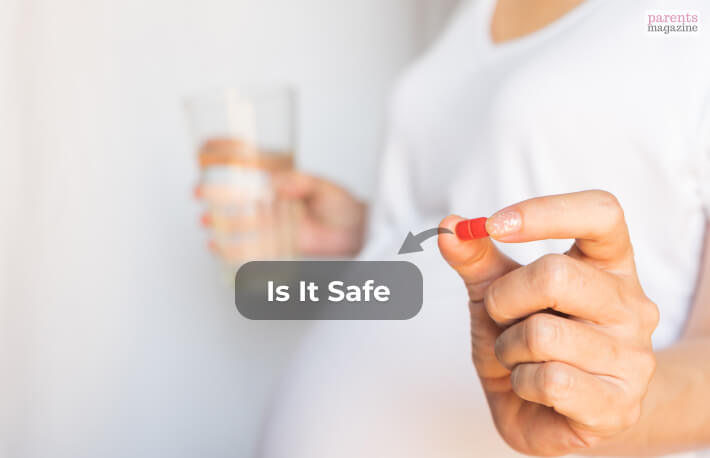
Can You Take Excedrin While Pregnant?
Pregnancy is not all about the glow that you get; a lot of problems come with it. One such problem is headaches and migraines, which are very common during pregnancy. So what can you do about it? Not all medication is good when you are pregnant.
But what about Excedrin? Can you take Excedrin while pregnant? Keep on reading to know whether or not you can take Excedrin while you are pregnant.
Why You Need Excedrin During Pregnancy

Though pregnancy is a happy moment in any woman’s life, with it comes a lot of discomfort and pain. And the most common types of health issues that occur are headaches and migraines.
One of the most frequently prescribed medications for migraine is Excedrin, but the problem with Excedrin is that it contains aspirin, which is strictly prohibited during pregnancy, but if it is needed, consult your doctor before intake.
Excedrin is one of the most sought-after pain-relief medications for headaches and migraines. With rising estrogen levels in pregnant women, headaches and migraines are common in pregnant women. Excedrin has proven to help everyone deal with these pains.
Can Pregnant Women Take Excedrin? Is It Safe?

The question that arises is whether Excedrin is a safe drug to take when you are pregnant. If you are unsure about the possible risks regarding Excedrin, it’s best to consult your doctor first. If your doctor thinks that your headache is due to a migraine and needs medication, then do what he suggests.
Excedrin is a medication that is composed of components like aspirin, acetaminophen, and caffeine. It is a combination of two pain relievers and an amplifier to enhance the analgesic effect. In every Excedrin product, at least one of these components will be present, if not all three.
Aspirin & Pregnancy

The relationship between Asprin & Pregnancy has always been very complicated since the beginning. If taken in a lower dosage, it might help with migraine and other health issues like Preeclampsia. But the risk is still there.
Aspirin is tagged as NSAID, Non-Steroidal Anti-Inflammatory Drug. This is why the FDA strictly suggests not using it after 20 weeks of pregnancy, as it can harm the unborn baby with rare kidney problems.
Caffeine & Pregnancy

Caffeine is okay during pregnancy as long as it is in a limited quantity of 200 mg per day and not more than that. Excedrin contains about 130 mg more caffeine than Excedrin Extra Strength.
One capsule of Excedrin contains the same amount of caffeine as 8 Oz of coffee. So one capsule can cover you for the day.
Can You Take Excedrin While Pregnant 1st Trimester?
If you are taking Excedrin during your first trimester, it is considerably safer than in the third trimester. But that doesn’t mean it is totally safe even then.
There are studies that show taking aspirin, even during the first trimester, can cause a rare birth difference called Gastroschisis. But if the headache is severe, taking an Excedrin is worth the risk. But whatever you do, consult your doctor first.
Can You Take Excedrin While Pregnant 2nd Trimester?
Towards the end of the pregnancy, the risk of consuming Excedrin increases. More health issues take places, such as complications with the baby and heavy blood loss at the time of delivery.
So at this time as well, consult your doctor first before you take the medication; he can monitor the severity of your headache and prescribe the dose that is safe to consume.
Can You Take Excedrin While Pregnant 3rd Trimester?
Taking Excedrin during your third trimester is too risky a move for you. So it is better to avoid taking any such medication during this time, as the chances of harming the baby are high.
Can You Take Excedrin While Breastfeeding?
Sorry, Mommy! It’s better to avoid medications that contain aspirin or caffeine while you are breastfeeding. The aspirin tends to travel into the baby through the milk and may cause the potential risk of Reye’s syndrome, which causes is serious brain and liver damage.
What Can I Take For A Headache While Pregnant?

We can understand that headaches and migraines are difficult enough and even more difficult if you are pregnant, the difficulty level is even more. But even though Excedrin is not safe during pregnancy, you can always get a doctor’s opinion and take a different medication.
Medication like Sumatriptan is quite effective in dealing with migraines and safe as well. As Acetaminophen is considered a safer painkiller when you are pregnant, it is the main ingredient in Sumatriptan.
For any other recommendation, you can always ask your doctor to recommend an alternative migraine medication to Excedrin.
Quick Bites
A medical health provider is the best person to help you when going through any discomfort during your pregnancy. But here is a quick recap of all the things we covered so far:
- It is recommended that you avoid a full-dose aspirin after the 20th week of your gestation, although a low-dose aspirin is considered safe
- If you must take a full-dose aspirin, try and limit the dosage and duration
- Your doctor may advise that your amniotic fluid be monitored as the risk of fetal harm, which includes kidney problems and a lower-than-average level of amniotic fluid, increases
- There is about as much caffeine in the recommended 2-tablet dose of Excedrin Migraine as in an 8 Oz cup of coffee
- Since little is known about the effects of caffeine on the baby, medical professionals recommend limiting caffeine intake to 200 mg a day
- Read the labels of the medicine you take very carefully and check for their active ingredients to stay safe
- Limit the amount of caffeine you take while pregnant
- If you think you might be allergic to Excedrin Migraine, or notice black, tarry stools, get in touch with a doctor right away
- You must be careful even after the birth of your baby- when breastfeeding, as the Acetaminophen could affect the baby through lactation. It could cause rashes, bleeding, and other issues in newborns
Medicines To Avoid During Pregnancy

Discomfort and uneasiness during pregnancy are way more common than you think. Hypothetically, 110/100 women face discomfort and uneasiness during pregnancy.
However, the same old medicines that you could take at usual times, might not be the safest option during pregnancy. If you already do not know about it, here is a list of certain medications that you need to avoid during pregnancy, apart from Excedrin.
Claravis Or Other Oral Retinoid Medicines
Isotretinoin (Claravis, Absorica) is a part of the medicinal class known as retinoids. These are lab-formulated forms of Vitamin A that treat acne.
Consuming isotretinoin during pregnancy might cause development abnormalities in the brain, heart, or nerves of the fetus. It also increases the risk of premature birth or miscarriage. The FDA considers isotretinoin as a Pregnancy Category X medicine. This means there are clinical studies proving it to be harmful to the fetus.
Lisinopril Or Other Blood Pressure Medicines
Keeping the blood pressure at a healthy level is particularly important when you are pregnant. But, some medications for blood pressure can be quite unsafe for consumption during pregnancy. These medicines have ACE indicators and ARBs in them. Some of the most common examples of such medications are losartan and lisinopril.
Warfarin
Warfarin is also deemed dangerous to consume during pregnancy. It is a blood-thinning medicine that is used to stop and treat blood clots. It is considered to be a Pregnancy Category D medicine. Therefore, in most cases, it is better to avoid it while pregnant.
Carbamazepine
Seizures during pregnancy associate with birth defects or some other major problems. Experts suggest continuing with the treatment for seizures during pregnancy. But, there are some anti-seizure medications that might turn out to be dangerous:
- Valproic acid and related products
- Carbamazepine
- Phenobarbital
- Topiramate
Lithium
Lithium is a doctor-prescribed medication for patients with bipolar disorder. It is also classified as a Pregnancy Category D medicine, as it might result in birth defects in the heart of the baby. Lithium could be particularly dangerous to consume during the first trimester when the fetal heart mainly develops. So, if you are trying to get pregnant, your doctor might help you stop consuming lithium safely or find an alternative. But, if your bipolar symptoms are too severe, they might ask you to restart your lithium treatments after the development of the fetal organs.
Lipitor Or Other Statins
Statins are medicines that lower your high levels of cholesterol. Some of the most common examples are simvastatin and atorvastatin.
Until 2021, every statin was considered to be Pregnancy Category X medication. However, in a recent clinical review, it was found that statins while pregnant are not associated with high birth defect risks. However, that didn’t rule out the other risks of stasis, like a miscarriage.
Ibuprofen And Other NSAIDs
In 2020, the FDA issued a warning against consuming nonsteroidal anti-inflammatory drugs from around 20 weeks of pregnancy. These drugs are related to a high risk of life-threatening problems in the kidneys of the growing fetus. That may also cause a problem with the fetal heart if consumed later during the pregnancy.
Wrapping Up!
It is understandable that pregnancy is both a joyous occasion as well as a tough time for women. Migraines and headaches are very obvious, but if you are thinking, can you take Excedrin while pregnant, then the answer is it’s better not to take it. Although it might be fine to take during the first and second trimesters, it definitely is not during the third trimester. Since Excedrin contains aspirin, it is harmful to the unborn baby. So it is better if you avoid it altogether. Even at the beginning of your pregnancy, you must be careful of your intake of any kind of medication, food, and drinks.
Your last trimester should not be the time you take any medication that you are not sure of. Whatever your issue or discomfort, your go-to help should be a medical professional. Avoid taking medicines or decisions related to health without medical supervision. It is better that you ask your doctor for an alternative medication if your headaches and migraines do not subside on their own.
Read Also:
Leave a Reply
All Comments
Already have an account?
Sign In
Create your account
User added successfully. Log in









20th June, 202425 July 2023 at 10:08 AM |
Greetings! Very useful advice in this particular post! It's the little changes which will make the most significant changes. Thanks a lot for sharing!
Alfred Cambell
20th June, 202425 July 2023 at 10:08 AM |
Greetings! Very useful advice in this particular post! Thanks a lot for sharing!